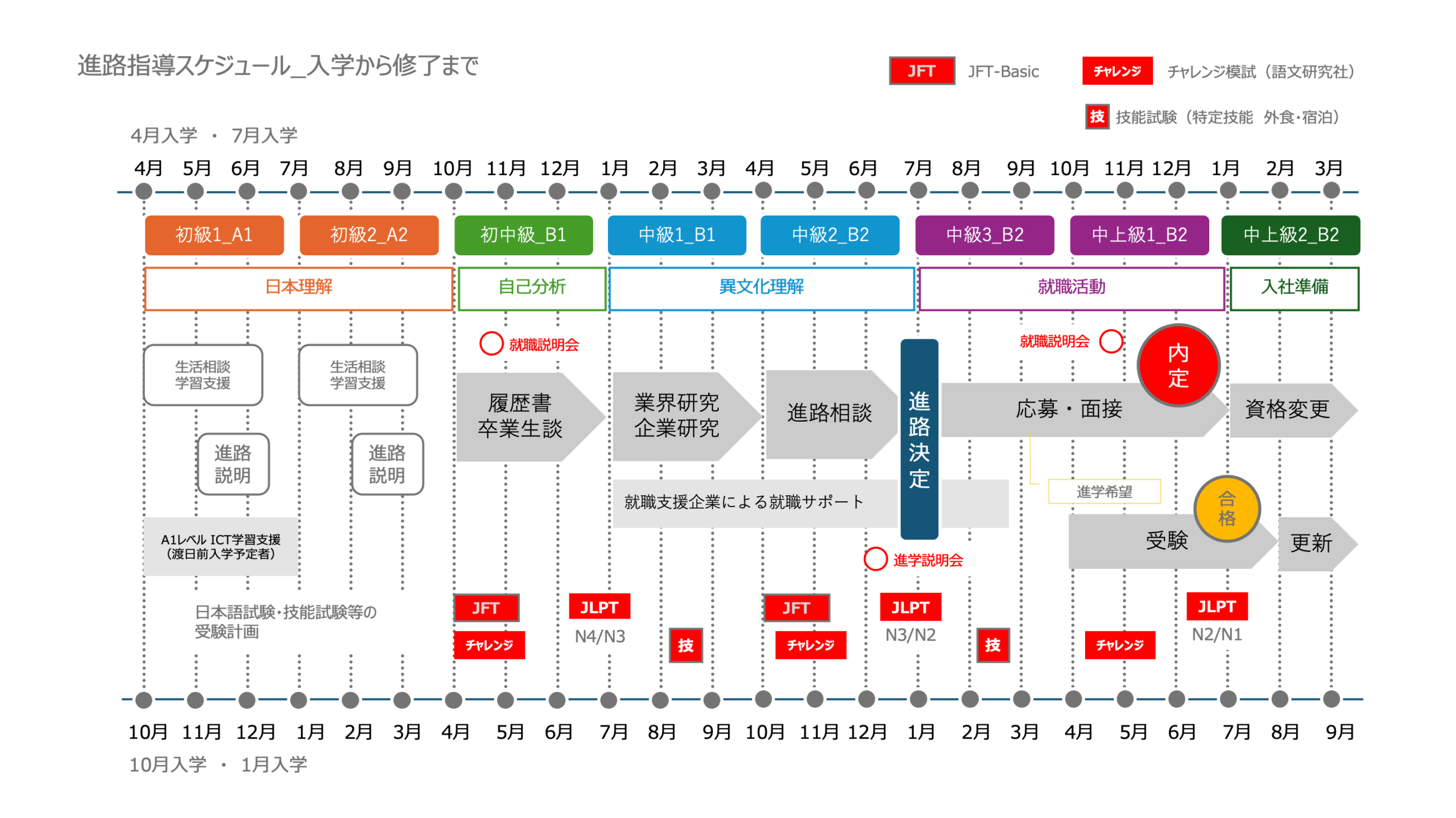Course
for Your Career Design
Browse Learning
日本語総合コース
General Japanese Course
コースの目的 Course Objective
「学ぶ喜び、教える楽しさを分かち合いながら、自分らしさを見つけ、他者を理解し尊重し合う心を育む。」という当機関の理念にそって、学習者が言語の習得だけでなく日本社会の理解を深めること、自分自身と向き合い将来の進路を主体的に考え選択する力と自発的に学び続ける姿勢を養うことを目的とする。
In accordance with our institution’s philosophy—“Sharing the joy of learning and the pleasure of teaching, while helping individuals discover their true selves and nurturing hearts that understand and respect others”—we aim not only for learners to acquire language skills but also to deepen their understanding of Japanese society. We strive to cultivate their ability to engage with themselves, proactively consider and choose their future paths, and develop an attitude of continuing to learn spontaneously.
到達目標 Target Achievement
具体的な話題でも抽象的な話題でも情報や考えなどの主要部分を的確に理解し、また伝え合うことができる。かなり広汎な範囲の話題について明確で詳細なテクストを作ることができ、自己の視点を様々な角度から説明できる。それぞれの進路先で必要となる言語能力だけでなく、日本社会への理解や学び続けることの基盤ができる。
Students can accurately understand and communicate the main points of information and ideas on both specific and abstract topics. They can produce clear, detailed texts on a wide range of subjects and explain their own views from various perspectives. This builds not only the language skills needed for their respective paths, but also a foundation for understanding Japanese society and continuing to learn.
Course Overview
コース概要
コースの主たる対象者は日本で就職を目指す外国人留学生とする。
The course is designed for international students aiming to find employment in Japan.
入学月(修了月) Admission (Graduation)
4月・7月入学(3月修了)
April/July admission (March graduation)
10月・1月入学(9月修了)
October/ January admission (September graduation)
学習時間(期間) Studying period
1,536単位時間(2年間)
2 years (1,536 hours)
1,344単位時間(1年9か月)
1 year 9 months (1,344 hours)
日本語能力の到達目標 Japanese Language Proficiency Goals
参照枠B2レベル
聞く、読む、やりとり、発表、書く
Japanese Language Education Reference Frame B2
Listening, Reading, Interaction, Presentation, Writing
Curriculum content
学習内容
本コースでは、日常会話や就職・進学に必要な実用的な日本語力の習得を重視しています。目的・学習内容・指導方法において明確な特色があり、日本語の5技能(読む・書く・聞く・話す・やりとり)に加え、初級レベルからキャリアデザインを学ぶ科目も設けています。さらに、ICT教材を活用することで、自立した学習習慣の形成を促進しています。
This course places a strong emphasis on acquiring practical Japanese language skills necessary for daily communication, employment, and higher education. It features a clearly defined approach in terms of objectives, content, and teaching methods. In addition to the five core Japanese language skills—reading, writing, listening, speaking, and interaction—the curriculum also includes career design as a subject from the beginner level. Furthermore, the use of ICT-based materials supports the development of independent learning habits.
レベルごとの到達目標(can do)
Achievement Goals by Level (can do)
基本的な表現が理解でき、短い読み物を読んだり、簡単な会話を聞いたり話すことができる。
You can understand basic expressions, read short texts, and listen to and speak simple conversations.
簡単な言葉や表現が理解でき、比較的短く易しい読み物を読んだり、日常的で身近な内容であれば簡単な会話を聞いたり話したりすることができる。
You can understand simple words and expressions, read relatively short and easy texts, and listen to and speak simple conversations on everyday and familiar topics.
身近な表現が理解でき、簡潔な内容であれば読んだり聞いたりすることができる。また身近な話題であれば簡単に書いたり意見を交わしたりできる。
You can read and listen to familiar expressions and simple content. You can also write and exchange opinions briefly on familiar topics.
日常的、具体的なものだけでなくより幅広い表現が理解でき、身近な話題であれば具体的な内容や要点をつかんだり、意見や考えを示すことができる。
You can understand not only everyday, concrete topics but also a wider range of expressions. You can also grasp the specific content and main points of familiar topics and express opinions or ideas.
あまり日常的でない表現も理解でき、非日常な話題についても要点をつかんだり、意見を交換したりすることができる。
You can understand expressions that are not very common in everyday conversation and grasp the main points of unusual topics, as well as exchange opinions.
非日常的な表現や抽象的な話題についての表現も理解でき、要点をつかむことができる。また、自身の関心のある様々な話題について意見交換をしたり考えを示すことができる。
You can understand expressions about non-everyday topics and abstract subjects, grasping the main points. You can also exchange opinions and express your thoughts on various topics of personal interest.
より広範囲で抽象的な表現が理解でき、かなり複雑な話の要点を理解できる。また、自身の関心のある様々な話題について自分の見方をしっかり説明、主張ができる。
You can understand a wider range of abstract expressions and grasp the main points of fairly complex discussions. You can also clearly explain and defend their own views on a variety of topics of personal interest.
抽象的で複雑な話も具体的な内容や要点が理解でき、幅広い話題について流暢かつ効果的に言葉を使い、発表や議論をすることができる。
You can understand abstract and complex topics, grasping specific content and key points, and can fluently and effectively use language to present and discuss a wide range of subjects.
進路指導
Career counseling and Academic guidance
初年度は、日本語能力の向上と日本社会への理解に専念し、自分自身を見つめ直しながら、自分の特性や強みを伸ばしていきます。
次年度から、他者と積極的に関わる力を育み、就職活動において自分を的確にアピールできるよう、万全の就職サポート体制のもとで指導を行います。また、学生一人ひとりに合わせた就職支援だけでなく大学や専門学校への進学支援も充実しています。
In the first year, students focus on improving their Japanese language skills and deepening their understanding of Japanese society. During this period, they are encouraged to reflect on themselves and develop their individual strengths and characteristics.
From the second year onward, students cultivate the ability to engage actively with others and receive comprehensive career support to help them present themselves effectively during job-hunting activities.
We offer personalized career support tailored to each student’s goals.We also offer comprehensive support for students wishing to pursue higher education at universities or vocational schools.
Educational support
学習支援
- 対面による面談 (Face-to-face consultations)
- 学習管理システムによる個別対応 (Individualized support via the learning management system)
- 生徒が使用する言語の教材提供 (Providing materials in the student’s native language)
授業開始後にクラス授業の内容に理解が追いつかず、困難を感じている 学生に対しては、各生徒のレベルに合った学習計画を立て、きめ細やか な指導ができる体制を整える。 3か月に1度の担任による学習・進路面談時に目標達成状況を確認し (成績カード、ふりかえりと目標シート使用)、学習目標の達成が難し いと判断された場合は、補習授業の提供や追加課題を通じて、必要に応 じた学習支援を行う。
For students who struggle to keep up with class content after instruction begins, we establish learning plans tailored to each student’s level and provide a system for detailed guidance. During quarterly academic and career counseling sessions with homeroom teachers (using report cards, reflection sheets, and goal sheets), we assess progress toward goals. If achieving learning objectives proves difficult, we provide supplementary instruction or additional assignments to offer necessary academic support.
- 生徒が学習面および生活面で問題を抱えた際には、個別相談の場を設 けると同時に、必要に応じて母国の保護者と通話またはオンラインで三 者面談を実施し、問題解決に努める。
- 病気や怪我が発生した場合には、提携病院(宮田胃腸内科皮膚科クリニック)と連携しながら対応
- 生徒が使用する言語での対応可能な担当者による外部機関引率
- When students encounter academic or personal difficulties, we provide individual counseling sessions. Additionally, we arrange three-way conferences with parents in their home country via phone or online as needed, working together to resolve the issues.
- In the event of illness or injury, we will coordinate with our affiliated hospital (Miyata Gastroenterology and Dermatology Clinic) to provide care.
- Escort by an external agency representative who can communicate in the student’s language
